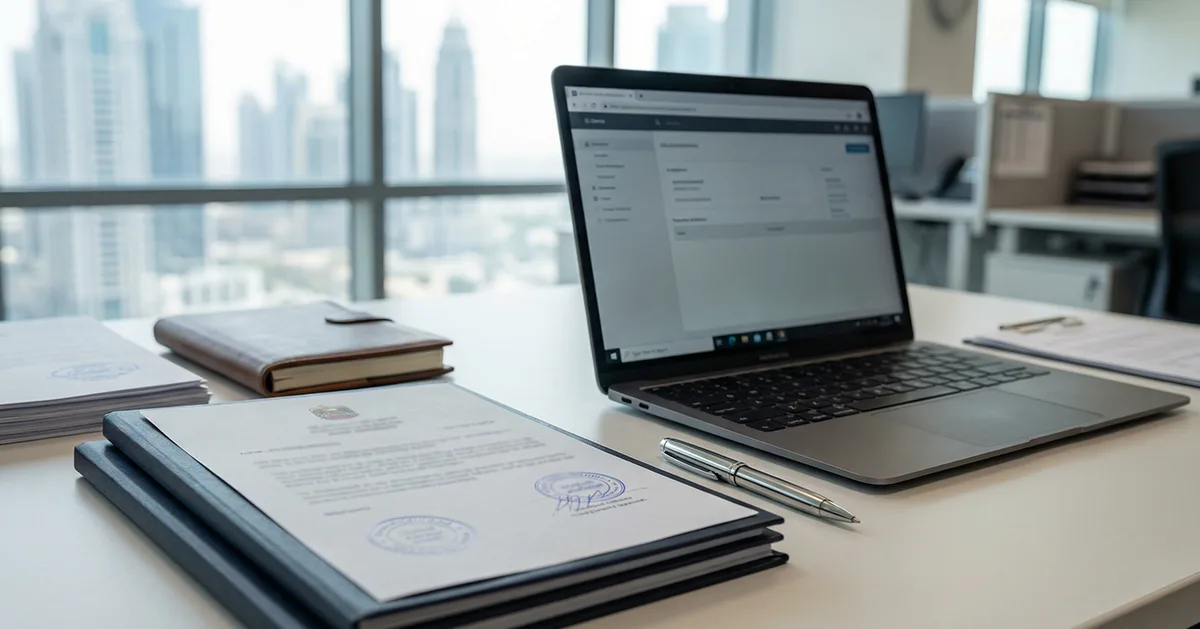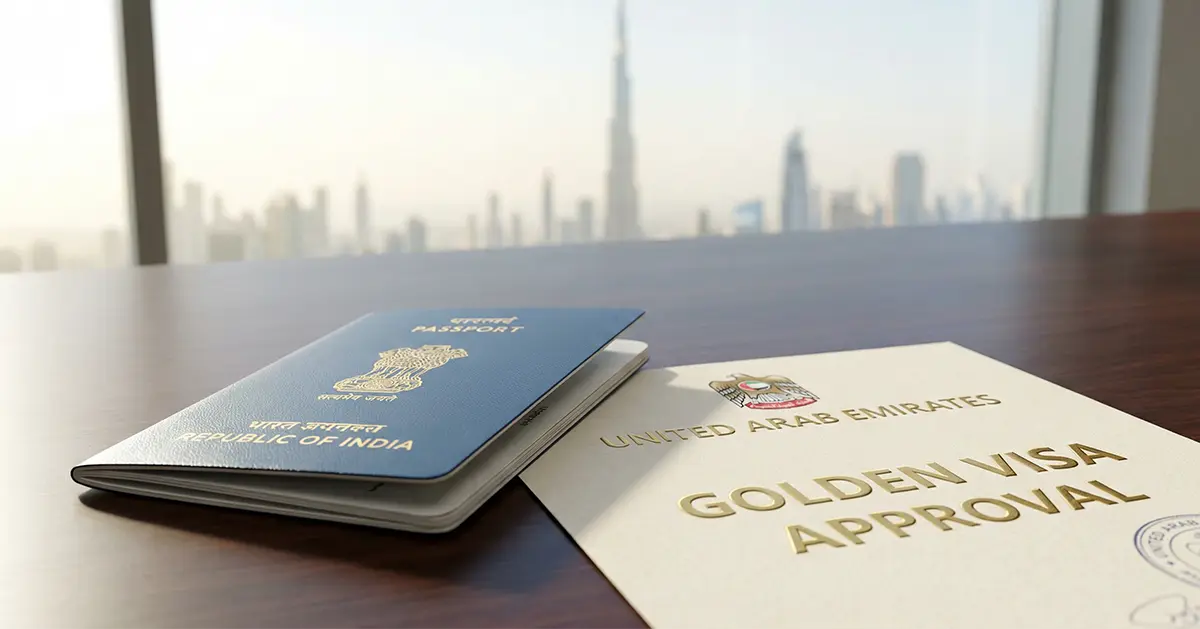
“Why settle for local when the entire world is your oyster?”
Millions of Indians are choosing Dubai for business, investments, and global banking. If you want to open a bank account in Dubai from India, you can access multi-currency funds, save on currency conversion, and manage international transactions with ease.
The UAE, along with its capital Dubai, hosts over 4.3 million Indians (nearly 38% of the UAE population). This includes entrepreneurs, freelancers, and frequent travelers. NRIs deposited Rs. 1,15,477 crore into Indian NRI accounts between April and December 2024, with a large portion coming from the UAE. The country’s tax-friendly policies, advanced digital banking, and global financial network make it ideal for NRIs.
This guide breaks down the entire process, from eligibility and documents to account selection and activation. It will help you open a Dubai bank account confidently, without confusion.
Understanding the Banking Landscape in Dubai
Dubai has a modern, well-regulated, and highly international banking ecosystem. The city hosts over 50 banks, including local giants and global players, offering services for individuals, NRIs, and businesses.
Banks in Dubai provide advanced digital platforms, cross-border transfers, multi-currency accounts, and tailored solutions for personal and corporate clients. This makes Dubai a preferred hub for global investors and Indian NRIs.
Some key regulators of the Dubai banking landscape are:
- Central Bank of UAE: Supervises all banks, enforces banking laws, and monitors anti-money laundering (AML) and counter-terrorism financing compliance.
- Dubai Financial Services Authority (DFSA): Regulates banks in the Dubai International Financial Centre (DIFC), enforcing international best practices.
- Securities and Commodities Authority (SCA): Oversees investment and banking operations outside free zones.
- Free Zone Authorities (e.g., DIFC Authority, ADGM Authority): Regulate banks and financial institutions within free zones, ensuring international compliance standards.
- Anti-Money Laundering and Suspicious Cases Unit (AMLSCU): Monitors AML compliance and suspicious financial transactions.
- Ministry of Finance (MoF), UAE: Sets financial policies and guidelines on taxation, foreign investment, and banking operations.
Understanding this landscape helps NRIs and investors choose banks that meet their needs, comply with regulations, and provide secure, efficient services.
Eligibility Criteria to Open a Bank Account in Dubai from India
Indians can open a bank account in Dubai without living in the UAE. The type of account (non-resident, offshore, or full-service) depends on your residency and financial profile. To determine eligibility, banks assess several factors:
- Residency Status: UAE residency is not always required. Non-resident or offshore accounts are available for NRIs.
- Age Requirement: Must generally be at least 18 years old; some banks require 21 for corporate accounts.
- Proof of Income: Salary slips, business income statements, or other financial documents may be needed.
- Existing Banking Relationships: A prior banking history or references can help with approval.
- Expected Deposits and Transactions: Banks assess your typical deposits, withdrawals, and transaction patterns.
- Credit History / Financial Background: Banks may check your credit score or past banking behavior.
- Purpose of Account: Clarify if the account is for personal savings, business, or investments.
- References / Bank Introduction: Some banks may require references from existing account holders or known international banks.
- Compliance Checks: KYC (Know Your Customer) verification and AML (Anti-Money Laundering) screening are mandatory.
- Nationality: Most banks accept Indian citizens; some may have restrictions for other nationalities.
Unsure if you qualify for a Dubai bank account? RegisterKaro evaluates your eligibility and helps NRIs choose the right account type, making the process smooth and stress-free. Contact us today.
Documents Required to Open a Bank Account in Dubai from India
To open a bank account in Dubai, banks require documents to verify your identity, financial profile, and eligibility. The exact documents vary based on whether you are opening a personal, corporate, or offshore account.
Commonly required documents:
- Passport Copy: Valid Indian passport.
- Visa Copy (if applicable): UAE residency visa for full-service accounts; not needed for non-resident or offshore accounts.
- Proof of Address: Utility bills, rental agreements, or bank statements from India.
- Proof of Income / Employment: Salary slips, employment letters, or business income statements.
- Bank Statements: Usually last 3–6 months from your existing Indian or international bank.
- Photographs: Passport-sized photos as required by the bank.
- PAN / Tax Identification: For compliance with Foreign Account Tax Compliance Act (FATCA)/Common Reporting Standards (CRS) rules.
Additional documents for corporate or offshore accounts:
- Company Documents: Trade license, incorporation certificate, Memorandum of Association (MoA), board resolutions, and Articles of Association (AoA).
- Shareholder / Partner Details: Identification and residency proof for all stakeholders.
- Business Activity Proof: Business plan, invoices, or documents demonstrating company operations.
- Reference Letters: From an existing bank, if requested.
- Declaration Forms: Signed statements about the source of funds and account usage.
- Attestation / Translation: Some documents may need notarization, attestation, or translation into English or Arabic.
Providing a complete and accurate set of documents ensures faster approval and smooth access to Dubai banking services.
Notes:
- Documents may need notarization or attestation for opening a bank account in Dubai for non-residents.
- Any documents not in English or Arabic must be officially translated.
- Banks may also request attested copies of company documents for corporate accounts.
Choosing the Right Bank & Account Type
Choosing the right bank and account type is the first step to a smooth banking experience in Dubai. Your choice affects fees, services, digital access, and international transfers.
Before selecting a bank, consider what matters most for your needs:
- Fees and Charges: Look at account maintenance fees, minimum balance requirements, and transaction costs.
- Services Offered: Check for online banking, debit/credit cards, investment options, and customer support.
- Digital Banking: Ensure mobile apps and internet banking are secure and easy to use.
- International Transfers: Confirm that cross-border payments are fast and cost-effective.
Once you know what you need, you can choose a bank that meets these requirements to open a bank account in Dubai. Some of the most popular banks for NRIs and foreign account holders in Dubai include:
- Local Banks: They provide strong local support, wide branch networks, and reliable service for residents. Prominent local banks include Emirates NBD, Mashreq Bank, and Abu Dhabi Commercial Bank.
- International Banks: They specialize in global banking, multi-currency services, and seamless international transactions. Popular international banks are HSBC, Standard Chartered, and Citibank.
Next, consider the type of account based on your purpose. Some popular types of accounts are:
| Account Type | Best For | Key Features |
| Personal Accounts | Savings, daily transactions, and managing regular expenses | Easy deposits and withdrawals, debit/credit cards, online banking |
| Corporate / Business Accounts | Entrepreneurs, startups, companies | Payroll management, merchant services, business transactions |
| Offshore / Non-Resident Accounts | NRIs, global investors | Multi-currency holdings, international transfers, tax planning |
| Specialized & Niche Accounts | NRIs with unique needs | Islamic, gold, premium, or value accounts; tailored benefits, investment options, and lifestyle perks |
Note: For Indians planning company registration in Dubai, multi-currency accounts offer flexibility to hold multiple currencies and handle international payments efficiently. However, they may require higher minimum balances and charge extra fees for certain currencies.
How Can You Open a Bank Account in Dubai from India?
Opening a bank account in Dubai from India is simple if you follow the right steps. Here’s a clear, actionable guide to help you through the process:
1. Prepare Documents
Before you approach a bank, make sure you:
- Decide which account you need: personal, corporate, or offshore.
- Collect all necessary documents: passport, proof of income, proof of address, bank statements, and company documents if applicable.
- Complete notarization, attestation, or translations if your documents are not in English or Arabic.
Estimated timeline: 2–5 days, depending on document readiness and attestation requirements.
2. Submit Application
You have two main options:
- Online Application: Ideal for non-resident or offshore accounts. You can submit documents digitally and avoid traveling to Dubai. Learn more about this in the section titled “Opening a Bank Account Remotely Via Digital Onboarding”.
- Branch Visit: Required for residents or corporate accounts in some banks. You may also use a bank representative to submit documents on your behalf.
Estimated timeline: Online- 1–2 days to submit; Branch- 1 day to deliver documents.
3. Fill Out the Application Forms
When filling out forms, make sure you:
- Provide accurate personal or company information.
- Include your contact details and account preferences.
- Share additional details about your source of funds or expected account usage if requested.
Estimated timeline: 1–2 days to complete forms accurately.
4. Complete Verification and KYC
Banks will verify your identity and financial background:
- KYC and AML checks are mandatory.
- Verification can happen in-person, via video call, or digitally, depending on the bank.
- You may be asked to provide information about your expected deposits and transactions.
Estimated timeline: 3–7 days for verification; may take longer for corporate/offshore accounts.
5. Make the Initial Deposit
- Some accounts require a minimum deposit to activate.
- You can fund your account from India via wire transfer or online remittance services.
- Multi-currency accounts may have specific requirements for different currencies.
Estimated timeline: 1–3 days, depending on transfer method and bank processing times.
6. Activate Your Account
Once your application is approved and funded, you will:
- Receive your account number and debit/credit card.
- Get internet and mobile banking access.
- Be ready to start using your Dubai bank account for personal, business, or investment purposes.
Estimated timeline: 1–2 days after deposit confirmation.
Tips for Faster Approval:
- Submit complete and accurate documents from the start.
- Ensure notarization or attestation where required.
- Provide translations for non-English or non-Arabic documents.
- Use bank referrals or introduction letters if possible.
- Clearly specify the purpose of the account and expected transaction volume.
- Keep communication prompt during KYC and verification steps.
While this traditional process works well, many banks now also offer fully digital onboarding. This allows NRIs to open accounts remotely without visiting a branch.
How Can Indians Open a Dubai Bank Account Remotely via Digital Onboarding?
Dubai banks now allow NRIs to open accounts quickly without visiting a branch. Digital onboarding makes the process faster, safer, and fully online. You can complete KYC, submit documents, and start banking within days. Here’s how it works:
- Choose the Bank and Account Type: Select a bank that supports remote account opening and decide on personal, corporate, or offshore accounts.
- Prepare Documents Digitally: Scan passport, proof of address, income statements, and any company documents. Ensure notarization or translations if needed.
- Submit Online Application: Fill out the bank’s digital application form via website or mobile app. Upload all required documents.
- Complete Verification & KYC: Attend a video call or follow the bank’s digital verification steps. Some banks may request additional information.
- Fund Your Account: Transfer the initial deposit from India using online remittance or wire transfer. Multi-currency accounts may have specific funding requirements.
- Activate Your Account: Once approved, receive your account details, debit/credit card, and set up internet and mobile banking.
Digital onboarding saves time, eliminates travel, and gives NRIs full access to Dubai banking from India. The entire process to open a bank account online or remotely in Dubai usually takes 7–14 business days. This depends on the bank, completeness of documents, and KYC verification.
Open your Dubai bank account in minutes from India! RegisterKaro guides you through seamless digital onboarding and mobile banking setup for NRIs.
Using the Dubai Bank Account: Features & Benefits for Indians
A Dubai bank account gives Indians global banking access, digital convenience, and investment opportunities. Some of its benefits include:
- International Money Transfers: You can send money quickly to India or other countries. Ensure to check transfer fees, speed, and exchange rates. Multi-currency accounts reduce conversion costs for frequent transfers.
- Debit and Credit Card Usage: Use your Dubai-issued debit or credit card in India and abroad. Banks accept these cards globally for online and in-store purchases. Some offer rewards, cashback, or travel benefits.
- Internet and Mobile Banking: Manage your account 24/7 through secure apps and online platforms. Check balances, transfer funds, pay bills, and track transactions instantly. Many banks support multi-currency management and real-time alerts.
- Business Convenience: If you operate a remote business or want a local presence without relocating, combining a bank account with a virtual office in Dubai is an ideal solution. It can help manage correspondence, establish credibility, and support banking operations efficiently.
- Fixed Deposits and Investment Products: Some banks provide fixed deposits, savings schemes, or investment-linked products. You can earn higher interest or explore international investments.
- Tax and Compliance Considerations (India): Funds repatriated from Dubai follow Indian tax rules. Double taxation agreements prevent being taxed twice. You must report the account and interest earned in your Indian income tax return.
A Dubai bank account simplifies international transactions, offers digital convenience, and gives access to investment opportunities while keeping compliance easy.
Common Challenges Indians Might Face While Opening a Dubai Bank Account & How to Overcome Them
NRIs may encounter a few hurdles when opening or using a Dubai bank account. Here’s how to handle them:
- Strict Documentation & KYC: Banks require notarized, attested, and translated documents. Submit complete papers to avoid delays.
- Funds Transfer Rules: RBI and FEMA regulations apply. Use official channels and keep transfer records.
- Currency Fluctuations: AED balances can gain or lose value. Use multi-currency accounts or time transfers wisely.
- Dormant Account Fees: Inactive accounts incur charges. Schedule small transactions or use online banking regularly.
- Minimum Balance Requirements: Many accounts demand a minimum deposit. Plan deposits to prevent penalties.
- Banking Costs: Monthly fees, transfer charges, and ATM costs can add up. Compare banks and pick cost-effective options.
- Limited Branch Access: NRIs may have restricted in-person support. Rely on digital banking or bank representatives.
- Verification Delays: Offshore accounts may take weeks to verify. Submit all documents correctly and fully.
- Different Banking Practices: UAE banking rules differ from India. Learn account terms, fees, and restrictions beforehand.
- Transaction Limits: Some accounts restrict payments or investments. Confirm account features meet your needs.
- Regulatory Updates: UAE or Indian law changes may affect usage. Stay informed to maintain compliance.
Avoid common hurdles like KYC delays, currency risks, and inactivity fees. RegisterKaro ensures smooth account activation and ongoing support for NRIs.
Alternatives to Opening a Dubai Bank Account
If opening a Dubai bank account is not immediately possible or necessary, several alternatives can help manage your UAE-India financial needs. From global banks to fintech solutions, these options offer flexibility, convenience, and lower costs. The table below summarizes the main alternatives:
| Alternative | Description | Key Benefits |
| International Banks (India & UAE) | Banks like HSBC or Standard Chartered operate in both countries | Simplifies transfers, reduces documentation, and offers cross-country access |
| Offshore Banking Solutions | Multi-currency accounts for NRIs without UAE residency | Flexibility, investment options, and easy international transactions |
| Fintech / Digital Wallets | Platforms like Payoneer, Wise, Remitly | Fast transfers, lower fees, better exchange rates |
| Opening a UAE Bank Account After Relocating | Full-service account after obtaining a UAE residency visa | Local debit/credit cards, in-person banking, and comprehensive UAE banking services |
Conclusion
Opening a bank account in Dubai from India offers Indians global banking access, digital convenience, and investment opportunities. Whether for personal savings, business transactions, or international transfers, having a Dubai account simplifies finance and provides flexibility. By understanding eligibility, preparing documents, and choosing the right bank and account type, you can enjoy a smooth banking experience in Dubai.
Frequently Asked Questions
Yes, non-residents, including Indian NRIs, can open non-resident or offshore bank accounts in Dubai. These accounts allow you to manage funds remotely, hold multiple currencies, and make international transfers. You do not need a UAE residency visa, but banks may require proof of income, address, and compliance with KYC and AML regulations.




